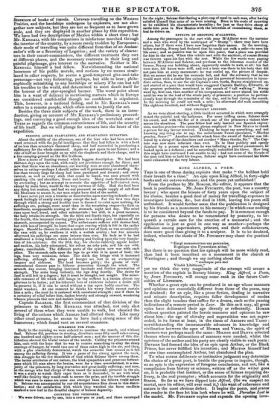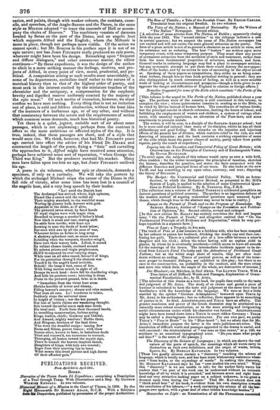KING ALFRED, A POEM.
Tars is one of those daring exploits that make "the boldest hold their breath for a time." An epic upon King Alfred, in forty-eight books and six octavo volumes; and the poem yet unfinished !
From the preface by Mr. ROSCOE, the editor, it appears that the book is posthumous. Mr. Jona Fercnrer, the poet, was a country lawyer ; who spent the leisure of forty years upon the subject of his choice, besides a good deal of money for travelling-expenses to investigate localities, &c., but died in 1838, leaving his poem still unfinished. It would further seem that the publication is designed by his friends as a monument to his memory (in which case nothing is to be considered beyond the funds to pay. It is common enough for persons who desire to be remembered by posterity, to be- queath a certain sum fur the erection of a memorial ; and the application is just as good in one way as another—perhaps the diffusion among papermakers, printers, and their collaborateurs, does more good than giving it to a sculptor. It is to be doubted, indeed, whether the shade of Mr. FITCHETT may chant the poetical finale,
" Exegi monamentam are perennius, Regalique situ Pyramidum altius."
But there is no question that his epitaph will be more widely read, than had it been inscribed on a monument in the church at Warrington ; and though we say nothing about the
" multaque pars mei Vitabit Libitinam,"
yet we think the very magnitude of the attempt will secure a mention of the exploit in literary history. King Alfred, a Poem, by Joint Fireosrr, will occupy some rank in the future Curi- osities of Literature.
Whether a great epic can be produced in an age whose manners and opinions are essentially different from those of the poem, may be doubted; for an epic, like a prose fiction, dealing in narrative and minute description, requires fuller development of modes than the slight touehes that suffice for a drama, such as the passing indications of a remote period in Lear. Be this as it may, all great epics have delineated their age directly or refiectedly. HOMER without question painted the heroic manners and opinions he saw about him : the age of chivalry and superstition was not super- seded, in its forms at least, in the times of AmosTo and Tess° : notwithstanding the immeasurable advances in knowledge and civilization between the ages of HOMER and Virtott, the spirit of manners was perhaps much the same : Mrtrorr and DANTE selected themes where no delineations of manners were needed, whilst the opinions of the author and his party are clearly visible in each poem : DRYDEN had formed the idea of an epic upon Arthur, or the Black Prince, but never fulfilled his intention ; and MILTON himself had at one time contemplated Arthur, but abandoned the plan. To what extent deliberate or instinctive judgment may determine the choice of a great poet, is beside the purpose to inquire, though, as an epic is the expression of foregone conclusions, and not, like a compilation from history or science, written off as the writer goes on, it is probable that instinct, or the sense of fulness requiring de- livery, is the real prompter ; which accounts for the originality and fitness. So far as we have dipped into Alfred, (for we suspect no mortal, save its editor, will ever read it,) this want of coherence and nature is the most obvious defect. It begins the poem, and stares the reader in the face let him look where he will. Paradise Lost is the model Mr. Fermterr copies and expands the opening invo• cation, and paints, though with weaker colours, the combats, coun- cils, and speeches, of the Anglo-Saxons and the Danes, in the same style as Miturox adopted "to trace the counsels of Hell or accom- pany the choirs of Heaven." The machinery vtonsists of dsemons beaded by Satan on the part of the Danes, and an angelic host which supports Alfred and the English ; where the Miltonic is more in place, though not perhaps more visible. Of the action we -cannot speak; but Mr. ROSCOE in his preface says it is not of an epic nature; nor has JOHN FITCHETT really produced an epic poem, whatever might have been his design. Remarking upon "frequent and diffuse dialogues," and other extraneous matter, the editor continues—" By these expedients, it was the design of the author to elicit in a more striking manner the feelings, motives, and pro- jects of Alfred, in every point of view, moral, prudential, and po- litical. A composition aiming at such results must unavoidably, in some of its departments, assimilate itself rather to the nature of a metrical history than to that of the highest order of poetry, and must seek in the interest excited by the miniature touches of the chronicler and the antiquary, a compensation for the emphatic brevity and dignified reserve uniformly exacted by the majesty of the epic muse." Of such merits of execution, however, we must confess we have seen nothing. Every thing that is not an imitation out of place, is cold and lifeless abstraction, without the least idea of the manners of a barbarous age, or of any other, and without that consistency between the actors and the requirements of action which common sense demands, much less historical poetry.
Yet there is a quiet, jogtrot, amiable sort of air about some passages, which is not unpleasing ; perhaps from the contrast it offers to the more ambitious or affected styles of the day. It is true, indeed, that these passages are short, and of a style that would soon tire. We think, however, that had Mr. FITCHETT years ago carried into effect the advice of his friend Dr. DRAKE and contracted the length of the poem, fixing a "finis" and curtailing the approaches to it, Alfred might have received some attention, perhaps have achieved some sort of reputation, "when George the Third was King." But the producer outstaid his market. Many men have fallen upon too late an age, but JOHN FITCHETT outlived his age.
A poem in six volumes, whether epic or chronicle, demands a specimen, if only as a curiosity. We will take the portent by which the archangel Michael stops the career of the Danes in the full tide of victory, after some time has been lost in a council of the angelic host, and a very long speech by their leader.
" Lo I amid the Daniell host The Archangel has arrived, where, high upborne, Blazed like a comet mid the turbid air Their mighty standard, to the watchful moon Waving ipi gleamy bulk, horrent with gold. Apparent in the midst, as if alive, The pictured raven stood, by fated hands Of royal virgins wove with magic rites, Breathed to avenge a murder'd father's blood. Now black it stood and vast, rearing aloft Its sable form terrific, with keen eye Seeming to scan the deeds of hosts below; Far-seen with awe by all the sons of war, Wherever helms on helms in long array A shadowy splendour cast, as ocean waves Subsiding when the tempests, thunder-wing'd, Have torn their watery beds. Lifted, it moved By valiant chosen hands, enclosed around By solemn priests and virgin prophetesses, Skill'd to expound its ever-varying shape, While near on all sides round, favour'd of kings, For its protection throng'd the choicest war. Touch'd by the angel's hand invisible, Behold! the imag,d bird, omen of fate, With living motion seized, in sight of all Droops its sunk head : down fall its shuddering wings, And hide its pendent crest ; tottering it drops Prone to the pictured ground, faint as in death.
"Immediate from the victor host arose
Shrieks horrible of terror and dismay, Filling heaven's concave; shouts and cries succeed, That stun all ears. Lo! wondrous to relate, Suddenly stops the universal mass In height of victory ; nor the hot pursuit Nor lust of battle claims one wandering thought.
Sole toward the awful omen each man bends Ilis total soul. Forth from their thousand bands, In trembling consternation, furious spring
Kings, leaders, chiefs; Guthrun and Oskital,
And Amund, mighty warriors! Hubba there, And Hingtiar, brothers of the fatal three Who wove the dreadful ensign: issuing flew Frena and Sidroc, potent thanes ; with these Names other, known to fame, in battailous deeds Tried and renown'd, too numerous to recount.
Thronging, all hasten toward the my stic sign, There to consult the heaven-inspired dames, Daughters of kings, with holy awe revered; Eager from their unerring lips to learn
What means this dread portent and high decree
Of their offended gods."



























 Previous page
Previous page